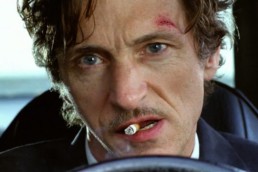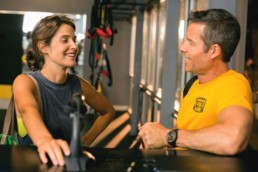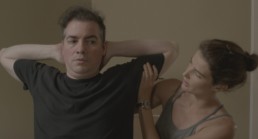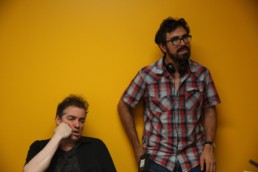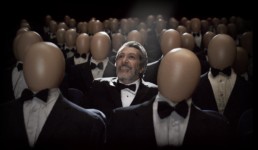Review: 'The Little Death'
Whereas the mega-fantasy phenomenon 50 Shades of Grey satiated willing audiences with ties and whips, a new little Australian sex comedy dominates from mining the humor out of the hilarious messiness that are the real-life repercussions of newly explored fetishes and fantasies within the relationships of struggling-to-remain-stable couples, in the ensemble-driven joy of a film, The Little Death.
Further proving that audiences were ready to embrace and enjoy the more kinky side of sex in relationships, Death was honored as the Audience Award Winner of the Narrative Spotlight at this year's SXSW. And there is certainly a whole lot to love here, as writer and director Josh Lawson's (Showtime's House of Lies) directorial debut is a truly crowd-pleasing comedy, that wins audiences over by both appeasing naughty natures with adult language and appealing to heart-felt adult curiosities and confusions about the taboo topics.
The film takes its cheeky title from the French "la petite mort," an idiom for orgasm. The varied sorts of foreplays and climaxes here are investigated by way of five suburban Aussie couples, each dealing with a particular fetish that pushes and pulls the partners together – emotionally and, yes, physically.
What works in Death is its winning combination of raunch in relation to its real relationship-building. We see each couple more or less starting things off with admittances and realizations of their being unsatisfied within their relationships in a multitude of ways, confessing to their partners before sleep, to their therapists, and with their friends. It's a premise that sets the stage for its more adult-felt and aimed enjoyment, not interested in taking the low-hanging fruit of making an all-out raunch-fest, but using the edge to substantiate these earnest couples deeper desires – to just make things work between them.
It's a premise that sets the stage for its more adult-felt and aimed enjoyment, not interested in taking the low-hanging fruit of making an all-out raunch-fest, but using the edge to substantiate these earnest couples deeper desires – to just make things work between them.
It's a joy then, to see the comic riches that come from the performances of all parties. Among them are uninspired couple Evie (Kate Mulvany) and Dan (Damon Herriman), who attempt to save their relationship after their their couples' therapist suggests introducing role-play to their life. The laughs in this couple's story come in the comic turn that spurs Dan to realize a sudden desire to become an actor, and the over-commitment that comes in each attempt at role play to follow. In one such inspired scene, a terrifically funny Herriman as Dan, with dorky self-dedication similar to Arrested Development's Tobias-Funke, puts his method performance in action in a "doctor and sexy patient" set-up, yielding a hilarious overly-professional diagnosis: "I'm afraid it's bad news." "Well, I have been a very bad girl..." "– You have hepatitis."
The more calculative and manipulative side of human fetish is explored in wholesome Rowena's (Kate Box) re-awakened arousal for her longtime boyfriend Richard (Patrick Brammall), discovered when a shocking loss suddenly brings him to tears. "Dacryphilia," as we learn, "the sexual arousal from tears," (and as the film defines in dictionary-style pop-up to aid in explaining each of the couples' more esoteric turn-ons) prompts Rowena to take advantage of the situation by proceeding to (after quickly jumping his bones) calculate more comic strings of pain to get Richard sobbing, from "losing" his dog or preparing select meals ("Onions again?"). Here again, the initial set-up of this couple, unsuccessful after many years of trying to get pregnant (which spurs Rowena to act on her more guilty impulses to achieve orgasm and therefore conception), allows the hijinks that follow to feel completely earned and has us rooting for all everyone involved along the way.
It's with these equally funny and poignant set-ups that Death succeeds, displayed perfectly in the single third act vignette pairing Monica (Erin James), a video-conferencing signer who translates the signing from deaf callers to recipients via telephone, and hearing-impaired Sam (T.J. Power), who asks her to connect a call to a sex phone hotline. Of course, the funny comes in Monica's windswept-ness, and hesitant proceeding to serve as the world's most awkward middle-man between relaying the erotic dirty talk between both parties. And with this rolling, funny scene, comes that familiar thread of humanity that runs throughout the entirety of the film, in the chemistry found between normal, nice guy Sam, and Monica, who develop their own personal connection while laughing through the absurdly awkward situation.
There is so much to like in The Little Death, and first-time director Lawson (who also stars in the film, as a boyfriend whose girlfriend stuns him in admitting to having a "rape fantasy" that he stumbles through trying to fulfill) succeeds in managing to give the whole thing a thoughtful treatment to the taboo subject, which could have otherwise been a canned series of one-note bro-jokes in "National Lampoon"-style send-up. The Little Death is wholly engaging entertainment and would be a wonderful selection for couples and audiences that feel so inclined to have their adult-aimed excitements and curiosities titillated.
The Little Death is now playing at Sundance Cinemas Sunset.
https://www.youtube.com/watch?v=BnnhesQ8Rxc
Review: 'Too Late'
Having its World Premiere at the LACMA as part of this year's Los Angeles Film Festival, first time feature film director Dennis Hauck, along with a full cast that included lead actor John Hawkes, presented Too Late, a modern day LA-set noir on a grainy, lovely, 35mm print.
Hauck, who introduced the film with his shaggy hair and bearded scruff, looked every part the fictional companion to the film's lead Dick, Private Investigator Mel Sampson (Hawkes), with a stringy, greased mop similar to that of Sampson's solo-riding sleuth self.
Hauck's lax groovy-self is clue enough to serve as a reference point in for any audience to see how the director, who also wrote the script, free-wheeled his own sensibilities into this shoot-from-the-hip noir number, which unfortunately, only supplants limitations into it. While oozing with dutiful detective homage to the likes of Raymond Chandler stories and those smoke-filled pulp noir dime-store novels, tin-thin dialogue and storytelling stands as the dividing line between audiences' being dazzled or dismissive of this midnight flick.
Too Late has all the cool, dress-up, and homage of those delicious noir movies we love so much, even if the biggest crime committed is that it's a little too guilty of knowing it.
If Tarantino-ringing words fill the entirety of what is spoken onscreen, than Too Late's non-linear storytelling cements it as a drive-in style flick that Pulp Fiction fans can readily wheel around to. However, there's a fine line between archetypal and artificial, and Hauck, with a story centered on the disappearance of a young stripper with a heart of gold, such as the one here named Dorothy (Crystal Reed) who disappears in this seedy Angeleno world filled with equal parts high-powered murderous men, such as dirty-handed crime boss Gordy (Robert Forster) and their always scantily-clad subservients, such as icy stripper Jill (Dichen Lachman), makes this a skirting stroll around the outside edges of what might have been an even juicier crime job, if it wished to be.
And yet, the string of surrounding interstitial characters (including Rider Strong as a comic drug dealer) only exist in relation to our main PI Sampson. Hawkes, a marvel in his character work and character-fleshing, slips into Hauck's sandbox to create a slippery yet cooly collected center of the film. Sampson dodges all of the offered and whizzing pieces that fly by, except there aren't really a ton of flying pieces here for him to really do so, forcing Hawkes to drum up his own inner-cool on his own, which fortunately is a task that his fine actor can do in spades. Hawkes entertains even further in a moment of the film's musical inspiration, as Sampson is urged to pick up an acoustic guitar in a closing nightclub and dilly up an impromptu cowboy-blues ballad, and at the end of a twenty minute long single-take spanning multiple mini-scenes and locations no less.
On this point: most impressive, or at least certainly most defining, is that Too Late is composed of five single-take scenes, assembled in clever order that coyly unearths more of its story with each new moment and scene. The groovy fluidity of craning and gliding cameras moves here and there, settling for a chunk of whip smart banter, and then gliding and tracking to the next composed arrangement and chunk of banter, and so-on and so forth, to give a sense of foreboding fate; as if each new in-scene movement only highlights the inevitability of what is to be revealed next, comic and tragic allike. It's absolutely some of the finest execution in this regard, and as a result, a sense of forward-leaning audience intrigue is felt and creates the needed sense of continually rolling anticipation in its smoky facade of chilled out present-ness.
Too Late is stylishly spun in this real Southern California LA world, on Hollywood Hills cliff-hanging homes, neon-lit strip clubs, and a third act drive-in theater with a ton of visual impress. Too Late has all the cool, dress-up and homage of those delicious noir movies we love so much, even if the biggest crime committed is that it's a little too guilty of knowing and showing it.
Too Late will have its final festival screening at LAFF on Wednesday, June 17th at 7:30pm at Regal Cinemas L.A. Live 13. Tickets here.
[youtube height="360"width="640"]https://www.youtube.com/watch?v=F_nOqkF_yHA[/youtube]
Review: 'Results'
The idea of opposites, of two diametrically opposing, frictional forces creating a third, synergistic meaning, seems like the type of humor that excites writer and director Andrew Bujalski. His other most recent film, Computer Chess, became one of the most buzzed-about films to come out of Sundance 2013 for its unique blend of diametrically opposed styles – '80s home video docu-style shooting, and a more modern sense of paranoid and deadpan hilariousness, to create a genre-leaping indie nugget of a crowd-pleasing film.
In the case of his most recent film, Results, Bujalski playfully (and, like all his films, not too seriously) combines further opposing elements; this time, full-hearted gym trainers encounter a pudgy, recently divorced millionaire, who exposes, through them, a cultural obsession with fitness, and the expectation of success to come. The humor here comes from angling these overly-stimulated gym trainers, more attentive to their bodies than to their hearts, with the easy-come-easy-go, sometimes-drinking, sometimes-pot smoking, bachelor millionaire, who's self-aware shortcomings expose the deeper shortcomings in "results-driven," externally focused self-improvement.
Read our exclusive interview with Andrew Bujalski on Results.
Fans of Bujalski, and those who've only sat through a half-confusing watch of Chess, will see a carryover in style in this follow-up feature. While assuming a more "conventional" storyline here than in his past films, the experience is still akin to Cassavetes-style watching, of finding the natural humor in observed human interaction that reveals a more than cultural, human-based ineptness, in our desire to connect with each other. While not outright self-parody, the comedy feels ingrained in the DNA of this film, requiring a subtle eye to take in.
It's slacker, laissez-faire attitude maintains refreshing returns throughout, resulting in a dialed in humor that Bujalski appears to only grow more comfortable with in each film.
Corrigan, as pot-bellied Danny, notes about finding the humor on a second read: "I read (the script) it again, and it occurred to me that it was a satire. I didn’t notice that on the first reading. When I expressed this to Andrew, he was reluctant to agree with me, that it was a satire, and I understood his hesitancy..."
Read our exclusive interview with Kevin Corrigan on Results.
Results is a relationship comedy, centering around three characters: the aforementioned Danny, Trevor (Guy Pearce), a fitness fanatic with eyes on expanding his gym, and Kat (Cobie Smulders), equally energetic and high-strung to the point of agitation over client's half-workouts. When Danny half-signs up at "Power For Life," Kat's fervor to train Danny at his home visit – a mansion with but a flat screen TV and some vintage electric guitars – sparks an interest in Danny to court Kat, who, being the self-actualized drill sergeant she is, of course, shoots down.
This brings out Trevor, who sometimes sleeps with Kat, to force himself to realize deeper feelings for his long-time employee – this coming at a time when his gym is looking to hit the big time and go-commercial. A sprinkling of scenes of Danny's fantasies, seeing an open lease space materializing with workout equipment right before his eyes, including a spiritual meditation center and juice bar, add even more welcomed relief to the film.
At 105 minutes, Results continuously trades off between progressing its conventional storyline, and tangential side steps, involving Danny Craiglist searching for someone to hook up his cable box, and another, humorous meeting and befriending with business lawyer Paul (Giovanni Ribisi), who is as good and welcome as ever in the small handful of scenes he's in.
Results won't provide huge payoffs in presenting big ideas, but it also doesn't intend to. It's slacker, laissez-faire attitude maintains refreshing returns throughout, resulting in a dialed in humor that Bujalski appears to only grow more comfortable within each film. As Danny's laid-back self might say, and as Corrigan actually and humbly voices: "I’d say go into it with an open mind."
Results is in theaters Friday.
https://www.youtube.com/watch?v=XoM_dM7tQvI
Kevin Corrigan on 'Results'
Even though his trademark melancholy demeanor suggests that he carries the weight of the world on his back on an almost daily basis, Kevin Corrigan doesn't work out all that much. In his newest film, Results (in theaters this weekend), Corrigan stars as Danny, a recently divorced millionaire with money (and pounds) to burn, which half-motivates him to get in shape from a pair of gung-ho gym trainers (Guy Pearce and Cobie Smulders). Corrigan's laissez-faire persona lends perfectly to Danny, who doesn't mind pouring a drink and smoking a little pot after his barely-earned workouts, clashing wonderfully with his overly-enthusiastic trainers disciplined attitudes and exposing their over-attention to their body and not their hearts, which director Andrew Bujalski (Computer Chess) expertly tells in this relationships-driven comedy (Don't call it a satire.) Speaking with Corrigan by phone, we found out more about the Indie veteran, including favorite comedies (among them, Taxi Driver), if he thinks about where his characters end up after the movie ends (he doesn't), and resentment after seeing in-shape people leaving the gym ("Are you doing this just to make everyone else feel bad?"). We begin:
When did you shoot Results?
I think it was June, of 2014. So, not quite a year ago.
How did you become attached to the film?
How did I find the script... It came to me through Andrew (Bujalski). Andrew and I have been, associated for, a half dozen years or so, through another Austin-based filmmaker, Bob Byington (7 Chinese Brothers). We talked about working together... I'm a fan of Andrew's. Anyways, that's how it came to me. It sort of grew, organically, through my natural association with Andrew, through our social lives.
Andrew Bujalski writes his movies with such a singular, deadpan kind of humor- what films do you draw comedic inspiration from?
I'll try not to give you a long-winded answer, I'm capable of that, I'll try not to do that now.
I like "National Lampoon" comedies, from the classic era. But I also am a Cassavettes guy and Actor's Studio School of "Accidental Comedy." To the degree that Taxi Driver is a comedy, which, I never really looked at it that way until DeNiro decided to be a comedy star and said, "Well you know, Taxi Driver was a pretty funny movie." And that's true.
You might say that Cassavetes' movies are comedies if you decide to look at them that way. But the thing that I always loved about those films was the humanity, or the "humanism" of those films, and when I read this script, the first time I read it, I thought it was a very straight-forward piece. A very accurate portrayal of people as they are, in real life.
I guess a couple of months went by, right before we were about to shoot it, I read it again, and it occurred to me that it was a satire. I didn't notice that on the first reading. When I expressed this to Andrew, he was reluctant to agree with me, that it was a satire, and I understood his hesitancy, and I kept it to myself, that I thought it was a satire. I never played it for laughs. But I didn't go into it without this perception that it was, funny.

Had you ever worked with, or met, your scene partners Guy Pearce and Cobie Smulders before making Results?
I had never worked with them, or even met them.
What was it like working with them?
Although Cobie and I never really talked about the sit-come genre, which, she had been on How I Met Your Mother, multi-camera, "situation" comedy...I've done a few of those. And I was aware of her experience with that stuff, and it never really figured into how we worked together. To my knowledge, she wasn't approaching this movie, Results, with that in mind. We were playing it straight, pretty much.
Just as far as working with them, there was never a false note or a moment where I thought "This really isn't working." I just thought they were really good actors and we all kind of fell in with each other pretty naturally from the get-go, and we were just in character, and just played it the way it was written. And it worked.
I'd say Guy, I knew Guy's work, a little bit more than Cobie's work. I know I liked him a lot in the movie, The King's Speech, he had a supporting role in that, he's had lead roles in other films, but I know that I really liked him a lot in that. And, it was more or less a "wait and see" type thing. We'll rehearse these scenes, we'll work together, and we'll see what happens. Guy and I did talk sometimes about acting, it turns out he's a fan of DeNiro and Pacino, we had that in common. But again, it was, once we established all those things, they really had no bearing on what we did together. We just tried to honor the material we were given to do.
I walk down the street, and nine out of ten people, that I notice, as I walk down the street, are in way more shape than I am, and in way more shape than I’ll ever be. And I don’t know how they do it, or why they do it, and I start to think, “Why is it so important to them?”
Do you ever think about where the characters you play in films, such as Danny, end up after the movie ends?
(Thinking) I... I don't really.
Laughter
Hopefully Danny continues on his "Power For Life" fitness regimen, and purges himself of all of his "ills," he really seems to want to get back together with his ex...maybe it doesn't...maybe he just opens a vintage guitar store. I don't know.
Your character doesn't seem to enjoy working out- what's your own relationship with fitness?
Yeah, I guess, in that regard, I have something in common with the character–
Laughter
I'm sporadically interested in physical fitness. It's always hard to, even when I feel like I'm vaguely serious about getting in shape, it's still vague and I'm still non-committal. It's of supreme effort to get up every day and try to achieve those goals. I guess the more specific the goal is, and the more help or motivation you have to do it, the more likely it is to get done.
But I just feel, I walk down the street, and nine out of ten people, that I notice, as I walk down the street, are in way more shape than I am, and in way more shape than I'll ever be. And I don't know how they do it, or why they do it, and I start to think, "Why is it so important to them?" People have memberships at gyms, and, you can always tell when someone's coming from the gym...
Laughter
And there is kind of a, minor sense of, resentment, like, "Are you doing this just to make everyone else feel bad?" It just seems to me like... you know, acting is a very vain profession, or it can be. That's the nature of it. But I think that would apply to any profession.
Where I live, in New York, there's a lot of people in finance, and I gather it's very important in that field to be competitive, to look better than the other people they're in the mix with. It's values, you have to do what you can to increase your own personal value if you want to stay afloat in whatever business you're in.
And I think it's possible to go overboard with that stuff. I don't think it's possible to overemphasize personal health, that's certainly important. But when it comes to one-ups-manship, and "being better" than everyone else, that's when I feel like... I like the line that Danny has about being pudgy and mellow and you know, that's good enough for me. I'm not looking to beat anyone.
It is important to be healthy, and it's also important to be nice. Nice to look nice, it's more important to be nice. That's my philosophy at the end of the day.
You have a busy year ahead of you, with Results and [Terrence Malick's] Knight of Cups coming out later this year. What else can we expect to see you in?
I can tell you, there's a show coming out, I guess in August, it's called Public Morals, and it's from, Edward Burns created the show, Steven Spielberg is the Executive Producer, and it's a period piece set in New York about the Public Morals division of the NYPD in the late sixties, mid to late sixties, and I played a part in that. It's cops and robbers, basically. Sort of loosely based on, if not real people, the real sort of scene in Manhattan, in New York at the time, regarding the Irish mob. So I ended up in that production on the Irish mob side of things.
I must say, I had fun working on that, I was proud of what I did on it, I had a really good part to play, and I can say that I have that coming out.
Any last words that you'd like people to know about Results before checking it out?
Well, a lot of people have seen it already, and, it is what it is. I don't know... it's a comedy. It's about relationships. Someone made a comparison to Broadcast News, just as far as the relationship side of it, the three people...
I'd say go into it with an open mind.
Director Andrew Bujalski on 'Results'
Just watch one of writer/director Andrew Bujalsk's films, and you'll see that not only does he welcome unconventionality in his filmmaking – but goes so far as to define himself by it. "There is that part of me that's never going to go away that is proud when somebody points at me and calls me a weirdo," the five-time feature film director notes over the phone while promoting his most recent film, Results (in theaters tomorrow). We had the chance to learn more about Bujalski, by way of talking about the success of his other most recent film, 2013's '80s docu-style festival hit Computer Chess, working with "professional" actors, and keeping it new in every film ("It’s not really worth doing if there isn’t some level of experimentation involved"). We begin:
When did you start shooting Results?
In June and July of last year, which is by far the fastest (turnaround). The fact that we're talking about the movie on the eve of its release and we weren't even shooting it a year ago, is mind-boggling to me.
What was it about Results that made the filmmaking process quicker than your previous films?
Well, necessity, in part.
The first movie (Funny Ha Ha, 2002) was finished relatively quickly, but the middle three I edited myself and really took my time, about a year and a half, which is the way I like working. It's certainly not a very pragmatic way of doing things. This time around we were dealing with a little more money from slightly more conventional financiers – conventional in the sense that they were hoping for a return on their investment sooner rather than later. So there were business reasons to go a little bit faster.
In general, a lot of this movie was me experimenting with different ways of working. First and foremost, Can I survive working in a more "professional" mode? Part of that means turning the thing around faster. I did work with an editor this time (Robin Schwartz), which I had never done before. Also, my wife had our second child right at the end of our shoot, and I'm a slow enough editor as it is, but with an infant in the house, I would have been extremely slower.
This is you fifth film, and I think it's interesting that you say you're "still experimenting." Is doing so part of your style as a director?
Every film is always a different experience. For me, it's not really worth doing if there isn't some level of experimentation involved, whatever that is. You can come at that a million different ways. That's the scary part and the exciting part. Every time I get through one of these and survive it, and I think, "OK, maybe I got away with that, sort of," I think about the crutch – the thing I was leaning on in that movie that made it OK and let me get away with the things I did...and what if I kick out that crutch, what's left?
On this movie, I kicked out a lot of crutches. I am very comfortable working with non-professional actors, small crews, shooting on film, and all these things that may have been "bad for my career" were my comfort zone, and to go into this more "conventional" mode was like learning a new language for me.

Can you talk about the success of your previous film, Computer Chess?
I couldn't have been more gratified at the reception that Computer Chess got. Going into that one, I had no idea what we were going to come out with and if anybody, anywhere, would be willing to screen it. For it to be as well received as it was was a great thrill.
What was the initial starting point with Results? Was there anything in particular that you wanted to explore in writing the film?
The first spark of it came from just sitting down and trying to get my head around what it would be like to work with professional actors. I figured if I was going to do something with more recognizable folks, then I had to build it differently. I first just started thinking of who I would want to work with, and obviously there are tons of great people out there, but the first two people that came to mind were Kevin Corrigan and Guy Pearce. I thought (Pearce) was such an interesting dude, and thinking about having Corrigan and Guy in the same movie was making me chuckle.
Ultimately, it was just throwing a lot of ideas at the wall and seeing what stuck, which is how I work on anything.
On this movie I kicked out a lot of crutches. I am very comfortable working with non-professional actors, small crews, shooting on film, and all these things that may have been "bad for my career" were my comfort zone and to go into this more conventional mode was like learning a new language for me.
I think it's fantastic that you got both Corrigan and Pearce, whose characters clash so wonderfully onscreen. What did you learn from working with them?
Working with both professionals and non-professionals alike, you know they are not puppets, you can't control them. You don't want to control them. You want to sit back and be surprised by them, and that's what makes it worth the headache of directing a movie.
I will say, the closest thing to an epiphany for me working with professionals is that I might have gone into it thinking they'll be so on top of it there will be no insecurities. Then you realize the whole process of acting is all about insecurity. The whole process of directing is about communicating with people about their insecurities and yours. Insecurity is like the language of acting, and that was an interesting reveal for me.
Your directing style feels so unique, and I don't say that lightly. It feels so specific to one person's vision and comedic sensibilities. Where do you draw your comedic inspiration from?
That's a great question. With specific regard to pop culture, it's hard for me to say, because I feel so isolated from it. The funny thing is, it's always a surprise to me every time. Every time I make something I get (caught up) in thinking everybody has my sense of humor. And then I read reviews.
Laughter
I feel like one of my earliest memories is being on the playground in elementary school and somebody called me weird, and I felt great pride – like I had accomplished something, and this was great news. I look back to that and think that pretty much explains everything since. Even though it gets harder as you get older, especially now, where it'd be great for me to make something that everybody did understand and love and made a billion dollars – I could use the billion dollars now with two kids, a mortgage, and all of these responsibilities – but there is that part of me that's never going to go away that is proud when somebody points at me and calls me a weirdo.
Any last words that you'd like people to know about Results before checking it out?
We'll see man, jury's out. I'm so curious to see what the life of this movie is, not just opening weekend growth, but what it continues to be for me and people who see it and worked on it. It's been a crazy ride for me, it did go really fast, but look– I'm still trying to figure out what my first film meant.
Review: 'Aloft'
There is great expanse in Aloft, a contemplative, magical-surrealist drama from first-time feature film director Claudia Llosa, which comes in the form of the film's snow-blanketed great white North setting, as well as its sweeping and far-reaching themes of faith and forgiveness. Unfortunately, this also extends to its slow-trudging pace and heavy-handed storytelling, making for a passionately made film that may appease patient viewers willing to join the emotional tale, but makes for an overly-saturated, lofty, experience.
At its core, Aloft is a film about a devoted mother's absence from her young children's lives (with a supernatural element being part of that reason) and a now grown son traveling to reconnect with her. Visually, (and despite the film's ice and chill in every shot), each frame is wonderfully filled with warm and lovely performances and cinematography that is obvious of this director's heartfelt intention to drive home a fully realized artistic intention, which also comes with overly-inflated emotional scenes.
Jennifer Connelly returns to the big screen as Nana, seen in the beginning of the film as a single mother bringing her children to a sort of spiritual gathering held in the snowy outdoor terrain. Winter-dressed attendees, we see anxious hopefulness in the gathered families, with the sickly wishing to be seen by a shaman (William Shimell), who brings a randomly chosen member into a stick-built hut resembling a bird's nest to perform mystic rituals to attempt to cure one of these wishful's.
Connelly as Nana displays an assured and quiet strength while keeping hope for her children and herself, even after her young son, Ivan's (Zen McGrath) pet falcon enters the shaman's hut during a curing in process, leading her into the private ritual. Her accidental presence ultimately reveals that perhaps she, a struggling single mother, has mystic curing gifts as well, that challenge the shaman's himself.
While it may put off select audiences unwilling to stay along for its slow-paced and heavy-handed viewing, there is a reward in its intimacy and commitment from all parties to tell this strangely beautiful story.
Cut to many years later, a reporter, Jannia, (Mélanie Laurent) visits the home of an adult Ivan (Cillian Murphy) to interview him about his mother, who we learn may or may not have real healing powers, depending on who you ask. Ivan's reluctance to speak with her suggests tension since the aforementioned days of his childhood though it's not initially expressed. Ivan, with a wife and baby of his own, is all mood and sharp edges, and we learn that his reservations come from ill feelings towards his mother, which the reporter presses Ivan over. Her persistence and seriousness convinces a still stingy Ivan to travel with her, to see his mother for the first time in a long time.
That "long time" is shown in alternating timelines, with the current day travels of Jannia and the older Ivan (and his falcon) as well as with the young Ivan and Nana, picking up after the stirring introduction. Connelly is our singular lead here, as we see her exasperated, but persevering character learn of her involvement with inadvertently curing a sickly person on that fateful day, which overwhelms not only her but her son Ivan as well.
Claudia Llosa manages the effort of balancing these stories out well, especially since we, as the audience, are unsure of what childhood event caused the older Ivan to hold wounded scorn towards his mother. The revelation ties together a blame against his mother for acting on her supernatural belief, which comes at a price for their youngest family member.
The film's climax comes at the point where we see, after a traumatic family event, Nana's confrontation with young Ivan about plunging into the abyss of what may be divinity or superstition. Murphy holds onto his emotionally retreating guard until reconnecting with his mother, now gray-haired and committed to herself as a self-realized shaman and media-skirting question mark, which reveals Jannia's ulterior motives in finding Nana and an emotionally cathartic ending for all involved.
Aloft holds a peculiar and heartfelt story with Llosa's strongly held artistically-yearning bend. While it may put off select audiences unwilling to stay along for its slow-paced and heavy-handed viewing, there is a reward in its intimacy and commitment from all parties to tell this strangely beautiful story.
Aloft opens at the Laemmle Royal this weekend.
https://www.youtube.com/watch?v=bQ2LIDwQ49U
Review: 'The Connection' ('La French')
Loosely based on real events, the new french action-thriller The Connection follows the 1975 drug war that was led out of the crime-ridden city of Marseille, France. A counterpoint to William Friedkin's 1971 classic The French Connection, The Connection is evenly styled in its period piece dressings but plays to overly familiar drug-war conventions that leave the overall effort as a breathlessly wasted time-out.
The '70s styled policier, starring Jean Dujardin as lead magistrate Pierre Michel, is only mildly compelling in its hard-boiled investigations and tough-guy law enforcing, against central kingpin Gaëtan 'Tany' Zampa (Gilles Lellouche). Lush French landscapes effectively offer pleasantly transporting scenes, but the heart of this story tracks to the same beats that make up other formulaic policiers – credit the naturally charismatic Dujardin and Lellouche for forming a potent dynamic as cat and mouse to drive this story.
The Connection is evenly styled in its period piece dressings but plays to overly familiar drug-war conventions that leaves the overall effort as a breathlessly wasted time-out.
Directed by Cédric Jimenez from a script by himself and Audrey Diwan, the film was shot on 35mm film, which lends rich grains to a film that could have implored much more grittiness to serve its story. The sprawling lines of corruption that link drug kingpins, gangsters, police and city officials fail to hold power in any court. It's not so much a misfire in not landing power in its punches, it's that it just appears to throw so few.
The Connection spans a years-long story of the relentless efforts of Michel, who chases Lellouche and his thuggish cohorts to the point of detachment from his own family and friends. Here, around the film's second act, things track well enough as a tension-building action film, but a half-time re-launch of Michel into the case feels empty in its effort. Lellouche, meanwhile, loses his built up baddie behaviors in the third act with middling regrets and worries that attempt to humanize his character, but only deflate a story that has already lost its steam.
The Connection, while stylishly conceived and with formidable talent in front of the camera, ends up spinning its own wheels as an aimless pursuit.
The Connection (La French) is in theaters today.
https://www.youtube.com/watch?v=Dx41FbyvSMw
Review: 'Reality'
It’s an interesting thing to judge something about a film so early on such as when a filmmaker’s new movie holds such a gigantically-ambitious sounding title that it in some ways suggests it to be a film of universally-commentating scope and total expanse, such as say, a title like Reality. Though in the case of writer/director Quentin Dupieux (who also did the cinematography, editing, and music, as usual), his audience should know that, no matter the title, they won’t be getting a life-defining opus–or even something of grand ambition in their full course helping of his off-brand cinema. Or for that matter, a movie made with any seriousness to it at all. Which is all for the very best. No, Reality (And in its native tongue, as the French-born, recent L.A. transplant filmmaker titled originally, Réalité) once again falls in line with Dupieux’s other reality-bending comic send-ups, making this his best film yet.
With this third feature film, Dupieux (AKA electronic music heavyweight Mr. Oizo) has settled into a story that he finally seems ready to tell. Gone is his freshman debut with the easy-play killer car tire gag in Rubber, gone is the sophomoric clean-up, hitting in the further midnight-movie shenanigans-laden Wrong Cops–here, is the piecemeal story about a film director who discovers that his alternate-reality self has already made the movie he intends to make, and…ya know–other things.
New audiences might find themselves unprepared for this offbeat brand of subversively alt-anarchic movie mayhem, but those with patience to try out a new midnight-movie with flair... should find themselves pleasantly entertained.
The movie opens in a wordless sequence where a back-woods rifleman sets in his sights, and takes down, a majestic deer, which is taken back home and gutted. Much to young Reality’s (Kyla Kenedy) amazement, the young girl sees a blue VHS tape fall out of the insides, but when she presses the issue, her father dismisses the notion that a tape could get into the belly of such a woods-creature- because that would be crazy. Meanwhile, the filmmaker/documentarian Zog (John Glover), wide-eyed, waiting, and hands folded in anticipation from a remote screening room, watches Reality’s real-life drama unfold in real-time, as she stares back into the camera, all the while waiting for a climax of sorts to reveal itself.
Beyond following that rabbit-hole, the movie mainly centers around a public-access channel camera operator by day/budding filmmaker by later-that-day, Jason (Alain Chabat), whose meeting with the eccentrically-odd movie producer Bob (Jonathan Lambert) results in having his killer-microwave B-movie (a sly wink to a former Dupieux movie) green lit–on the caveat that he find the correct “dying human shriek” sound effect. With appearances by Reality’s cross-dressing principal Henri (Eric Wareheim) and public-access show host in-an-itchy-rat-costume, Denis (Jon Heder) (it’s also obvious to see Dupieux aligning his comedy with the Adult Swim oddness of Tim and Eric Awesome Show, Great Job! here), the film circles around to these seemingly non-connected stories, but finds a common (if long-shot) thread to pull the entire story together.
So, where does a film like this, one built on the honest intention of being purely meaningless and non-logical, stand with his other films, and movies moreover? Where Dupieux’s wheelhouse is in all-out absurdity, Reality finds itself operating in a much more operatically-meta stage, and somewhat more narrative-driven. Jason the director, trying to take his mind off of the stress of finding that perfect excruciating scream, goes to the movies- and sees his movie about a killer microwave playing, and, panicking, tries to block the projection and tell the audience that they aren’t supposed to be watching a movie that hasn’t come out yet.
No doubt, as much as Dupieux wishes to claim that he is all detached dead-pan shenanigans, he is at his best when he allows himself to dip his toes into the pool of substance, but only just-so. New audiences might find themselves unprepared for this offbeat brand of subversively alt-anarchic movie mayhem, but those with patience to try out a new midnight-movie with flair, and definitely for his fans already familiar with his devilish brand, should find themselves pleasantly entertained. Because, as he’s proven in his third time out, even when this director seems to be spinning his wheels, the wheels ends up finding the ability to grow telekinetic powers and kill an entire town. Or something.
Reality opens at the Arena Cinema in Hollywood this Friday.
https://www.youtube.com/watch?v=Qr6D6Z7IAAg


